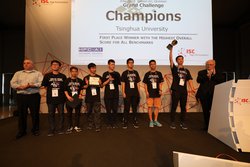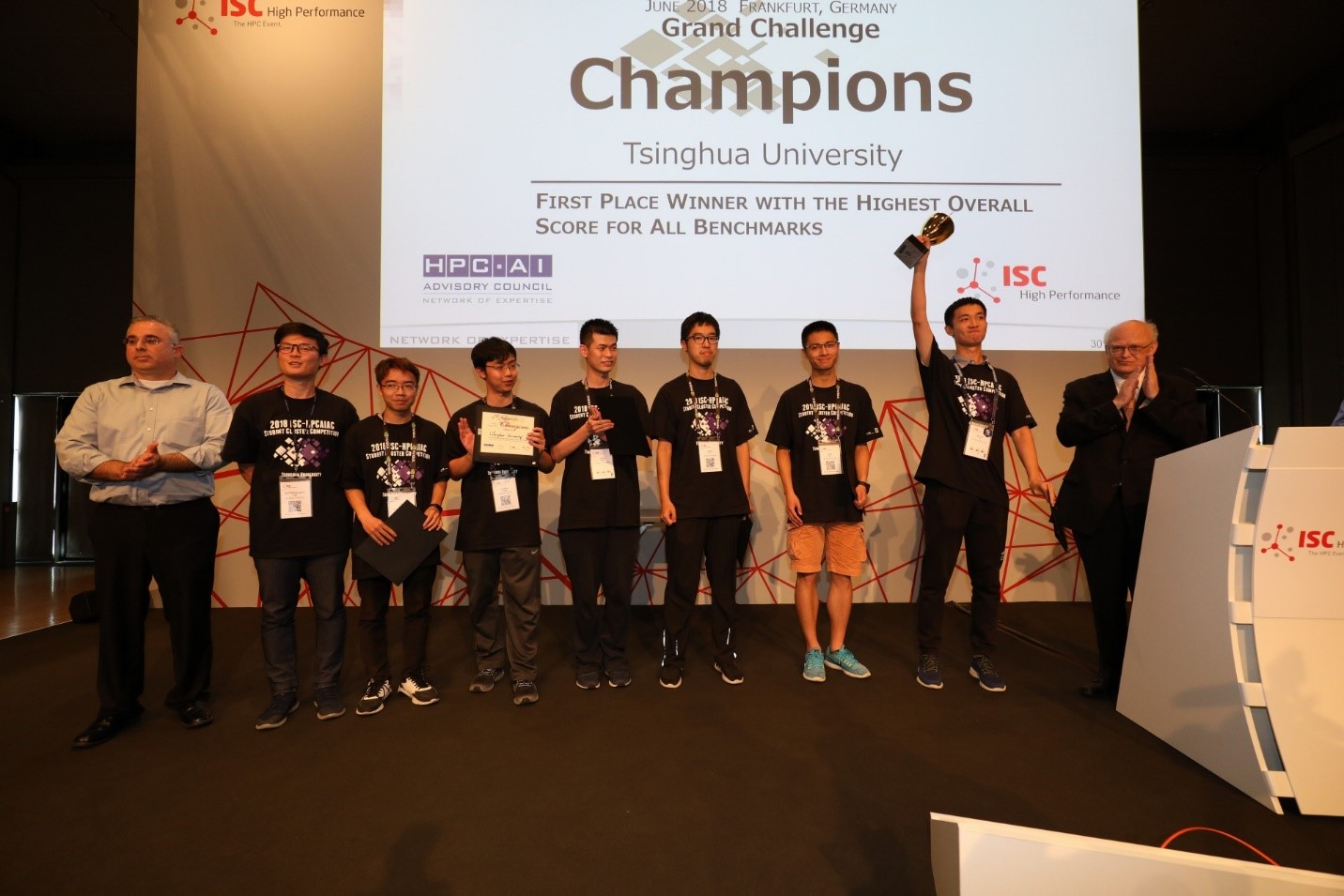
Aug. 20, 2018
By: Elizabeth Leake, STEM-Trek
Every contest has winners and losers. If you have spent much time following student cluster competitions at HPC conferences, you may wonder, as I have, why some win time and again, while others have a difficult time placing. You may also wonder why some never make it on the field.
 Source: ISC High Performance
Source: ISC High Performance
Since attending the ISC High Performance 2018 (ISC18) Student Cluster Competition (SCC) in Frankfurt, June 24-28, I have investigated reasons why this could be the case. Since then, I have interviewed seven current and former team leaders.
ISC18 SCC is the result of a collaborative partnership between the ISC Group and the High Performance Computing (HPC) Advisory Council. According to HPC Advisory Council Chair Gilad Shainer, the committee tries to allow as many new teams as possible to compete each year. Because the student-to-other ratio is lower at ISC than it is at larger events, students can network with experts, and have ample breaks from the competition to explore what the entire conference has to offer.
ISC provides student-attendees with a wealth of opportunities. The award ceremony is held during a general session which places the student program in the spotlight. This year, 73 students participated in the tutorial program, 53 joined two tours of the main show and 160 attended the STEM job fair which offers students an intimate opportunity to chat with vendors and learn about the unique corporate culture that each represents. Twelve organizations were represented, including ATOS, NVIDIA, Microsoft, Micron, NAG, PRACE, Riken, LRZ, Uni Heidelberg, ITWM, ICHEC, and HiPEAC.
When I asked if he was pleased with the job fair, Micron’s Casto Salobrena Garcia said, “It’s going great! This event will help us fill the workforce pipeline. We have met many talented students, and at least three have expressed an interest in working for Micron in the last few minutes.”
Both ISC and SC SCC competitions are culturally diverse: ISC limits itself to 12 teams each year, and in 2018 there were teams from 11 countries, including two from Germany. This year, SC18 will host 15 teams from eight countries. Information about past competitions can be found on the HPC Advisory Council website.
It is clear that while technical excellence and aptitude are equally distributed around the world, opportunity and access are not. In countries that can afford to place STEM as a top priority, students are provided with everything they need, especially the high achievers who are encouraged to excel from an early age. Education is low-cost or free, so there is little or no student debt. Scholarly travel is supported, students have time to train and they are at liberty to accept unpaid internships and participate in more extracurricular training activities. In other words, they don’t have to work nights and weekends at McDonald’s to pay for rent, food, books or tuition.
Since the global economic crisis of 2008, universities everywhere have had to tighten their belts a little more each year. To bridge government funding gaps, in some countries, industries provide financial support to regional schools that feed the workforce pipeline that drives their innovation. Otherwise, education is typically supported by a taxpayer investment, and a lot has to do with whether or not society places STEM excellence as a priority.
Since the ISC-SCC competition’s inception in 2012, there have been between one and four teams from the United States competing each year, but the US was a no-show in 2018. Since returning from Frankfurt, I have interviewed several from US schools who currently support teams that are participating in SC18, and others who have taken teams to ISC in the past. They all said that their time and money are limited this year. Despite US professional participation at ISC increasing about 11 percent each year since 2013—in 2018 there were 685 US attendees out of 3,505—international travel for US students was not a 2018 fiscal priority.
When forced to choose one annual competition, US SCC team leaders opt for SC, over ISC, for reasons of economy and maximum exposure. It’s cheaper to fly a team to a destination on the same continent than it is to travel halfway around the world. Plus, some US team leaders feel that SC, with a much larger footprint drawing between 10,000 and 14,000 attendees, exposes students to more than they would find at any other competition, although the size is often overwhelming for first-time conference attendees. Sadly, science diplomacy is a casualty of economy at a time when we’re faced with global grand challenges that most agree will require broad, international collaborations to solve.
Most US team leads claim that their rock star students’ time is spread thin. They are heavily recruited for extra-curricular activities and must work outside of class. In the US, university jobs limit the number of hours a full-time student can work to 20 hours per week, but some take second jobs to help make ends meet; especially if they have a family. With the cost of education rising while wages stagnate, US graduates carry, on average, $30,000 in student debt, representing a total US student debt of $1.521 trillion. Grads from the United Kingdom carry about £32,000 in debt, which is roughly equivalent to $42,605 US. That number comes from a Parliament report, which tracked post-2012 graduates; those with an advanced education carry even more debt.
In the US, the 2018 student loan rate increased to 5.05 percent. That means that over 15 years, a $30,000 debt will cost $42,863.84 or $238.02 per month. This is why fewer can find affordable housing, more live with their parents well into their adult years (which delays parent retirement), fewer are buying homes, and more are defaulting on student loans.
For SCC team members who struggle economically—even if they’re stellar scholars who can take time off with their school’s blessings and have 100 percent of their travel covered—lost income means that they will dig themselves deeper into the financial hole. If they are from a region or demographic with high unemployment, their job prospects and repayment capacity upon graduation aren’t promising either. One in six US graduates has debt that exceeds their income, according to MarketWatch.
Some countries have academic schedules that simply won’t allow their students to compete at ISC in the June-July timeframe, or at SC in November, for that matter. Anyone in the Southern Hemisphere faces a long-distance challenge, whether traveling to Germany for ISC, or to the US for SC. Some schools function on opposite academic schedules and seasons; when it’s early-summer in Chicago, Cape Town residents are bracing for winter.
Allan Williams, Associate Director for Services and Technology at the Australian National Computational Infrastructure said that Australia’s major exams fall in June and November; it is therefore more difficult for their students to participate, although Monash University will show up for SC18—this is their first year to compete. Monash Team Coordinator Lance Wilson said, “our travel expenses are supported by the Multi-modal Australian ScienceS Imaging and Visualisation Environment, or MASSIVE, a broad collaboration of publicly- and privately-funded Australian research and technology stakeholders. Since several Monash University partners are technology vendors, our competition hardware is donated, and there is a ready supply of HPC experts to mentor our team.”
The South African team has a similar problem. According to South African Trainer David Macleod, “SA mid-year exams end mid-June. ISC doesn't usually clash, but if it does, the university grants deferred exams. Unfortunately, end-of-year exams start mid-November, so that’s why we can’t participate in SC.”
The EPCC team has a different sort of scheduling issue. Weronika Filinger, HPC Applications Developer at the University of Edinburgh (EPCC), said the the EPCC team traditionally participates in the ISC-SCC, but they can’t make it to SC. “The competition is part of our team member’s dissertation since all are graduate scholars,” she noted. Edinburgh’s MSc program begins in September and ends with dissertation submissions at the end of August the following year. SC simply doesn’t fit into their schedule.
In part two of this article, which will run next week, I report on the three Student Cluster Competition teams that captured top honors at ISC18 in Frankfurt and discuss their unique formulas for success.
